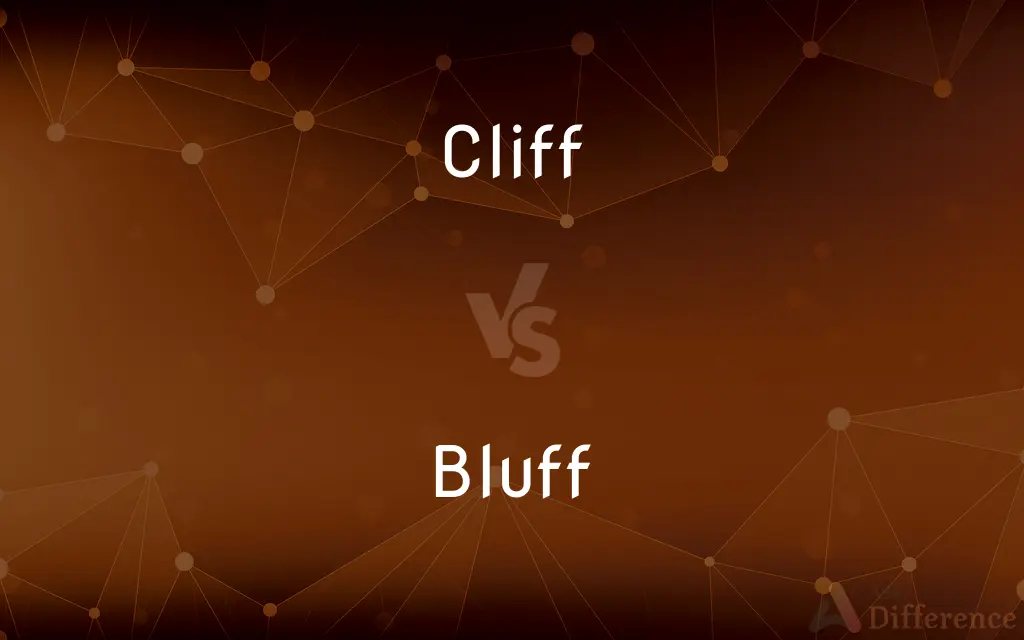Cliff vs. Bluff — What's the Difference?
By Tayyaba Rehman — Updated on August 24, 2023
A "cliff" is a steep rock face, usually by the coast, while a "bluff" is a broad, rounded cliff, typically alongside a river or the coast.

Difference Between Cliff and Bluff
Table of Contents
ADVERTISEMENT
Key Differences
A cliff typically represents a steep, often vertical rock face that forms due to erosional processes, especially those occurring alongside coastlines. "Bluff", on the other hand, can be described as a type of cliff but is generally more rounded and broad. It's not as sheer as cliffs and is commonly found along rivers or coastlines. The term "bluff" might be more commonly associated with the terrains of the central United States, especially alongside the Mississippi River.
When one imagines a cliff, they often picture a sharp, rugged drop-off, frequently resulting from wave action or other forms of erosion. Cliffs can be found around the world, from the white cliffs of Dover to the towering sea cliffs of Hawaii. In contrast, a bluff, while still elevated and providing commanding views of its surroundings, has a softer and more rolling appearance. The difference isn't just in the form; the naming can also be regional. In some areas, what one person might call a bluff, another might refer to as a cliff, especially if they're not steeply inclined.
Comparison Chart
Definition
Steep, often vertical rock face
Broad, rounded elevated landform
Typical Location
Usually by the coast
Along rivers or coastlines
Shape
Sheer and rugged
More rounded and gentle
ADVERTISEMENT
Result of
Erosional processes
Erosion but typically less sharp
Regional Usage
Widely used globally
More common in central U.S.
Compare with Definitions
Cliff
A high, steep surface formed by erosion.
Rock climbers often challenge themselves on the tough cliffs.
Bluff
A cliff or hill with a broad face.
The trail led us up and over several bluffs before reaching the valley.
Cliff
A significant vertical, or nearly vertical, rock exposure.
Birds nested in the nooks and crannies of the cliff.
Bluff
A high, steep bank or cliff.
We picnicked on the bluff overlooking the river.
Cliff
A steep rock face, especially at the edge of the sea.
The lighthouse stood precariously on the cliff's edge.
Bluff
A coastal landform with a rounded appearance.
The city's skyline could be seen from the distant bluff.
Cliff
A precipice formed through various environmental factors.
The coastline was dotted with towering cliffs that looked majestic against the setting sun.
Bluff
A broad, rounded elevated terrain often by a coast or river.
The house was built atop a bluff, providing panoramic views of the surroundings.
Cliff
An elevated, sheer rock face seen on mountains or coasts.
Tourists flocked to the viewpoint to gaze at the magnificent cliff.
Bluff
Try to deceive someone as to one's abilities or intentions
The object is to bluff your opponent into submission
He's been bluffing all along
They bluffed their way past the sentries
Cliff
A steep rock face, especially at the edge of the sea
A coast path along the top of rugged cliffs
Bluff
Elevated land, gentler than a cliff, alongside water.
Children played at the base of the bluff, their laughter echoing upwards.
Cliff
In geography and geology, a cliff is an area of rock which has a general angle defined by the vertical, or nearly vertical. Cliffs are formed by the processes of weathering and erosion, with the effect of gravity.
Bluff
(of a cliff or a ship's bows) having a vertical or steep broad front.
Cliff
A high, steep, or overhanging face of rock.
Bluff
The act or practice of bluffing.
Cliff
A vertical (or nearly vertical) rock face.
Bluff
An act of bluffing; a false expression of the strength of one's position in order to intimidate; braggadocio.
That is only bluff, or a bluff.
Cliff
(figurative) A point where something abruptly fails or decreases in value etc.
Bluff
The act of bluffing in poker; deception by a false show of confidence in the strength of your cards
Cliff
A high, steep rock; a precipice.
Bluff
Frighten someone by pretending to be stronger than one really is
Cliff
A steep high face of rock;
He stood on a high cliff overlooking the town
A steep drop
Bluff
An attempt to deceive someone into believing that one can or is going to do something
His game of bluff
The offer was denounced as a bluff
Bluff
A steep cliff, bank, or promontory.
Bluff
A grove or clump of trees.
Bluff
Direct in speech or behaviour but in a good-natured way
A big, bluff, hearty man
Bluff
To engage in a false display of confidence or aggression in order to deceive or intimidate someone
The management debated if there would really be a strike or if the union was bluffing.
Bluff
To make a display of aggression, as by charging or baring the teeth, as a means of intimidating another animal.
Bluff
To try to mislead opponents in a card game by heavy betting on a poor hand or by little or no betting on a good one.
Bluff
To deceive or intimidate (someone) by a false display of confidence or aggression.
Bluff
To try to mislead (opponents) in a card game by heavy betting on a poor hand or by little or no betting on a good one.
Bluff
To start but not carry out (an action) as a means of deceiving or intimidating another
The pitcher bluffed a throw to first base.
Bluff
A steep headland, promontory, riverbank, or cliff.
Bluff
Having or showing a rough and blunt but not unkind manner
"the great big bluff guests who told bawdy jokes and got up early to watch the sun rise" (Erin McGraw).
Bluff
Having a broad, steep front
The boat's bluff bow.
Bluff
(poker) An attempt to represent oneself as holding a stronger hand than one actually does.
John's bet was a bluff: he bet without even so much as a pair.
Bluff
The card game poker.
Bluff
One who bluffs; a bluffer.
Bluff
A high, steep bank, for example by a river or the sea, or beside a ravine or plain; a cliff with a broad face.
Bluff
(poker) To make a bluff; to give the impression that one's hand is stronger than it is.
John bluffed by betting without even a pair.
Bluff
(by analogy) To frighten or deter with a false show of strength or confidence; to give a false impression of strength or temerity in order to intimidate and gain some advantage.
The government claims it will call an election if this bill does not pass. Is it truly ready to do so, or is it bluffing?
Bluff
To take advantage by bluffing.
We bluffed our way past the guards.
Bluff
To give false information intentionally; to lie; to deceive
Bluff
To fluff, puff or swell up.
Bluff
Having a broad, flattened front.
The bluff bows of a ship
Bluff
Rising steeply with a flat or rounded front.
Bluff
Surly; churlish; gruff; rough.
Bluff
Having a broad, flattened front; as, the bluff bows of a ship.
Bluff
Rising steeply with a flat or rounded front.
Its banks, if not really steep, had a bluff and precipitous aspect.
Bluff
Surly; churlish; gruff; rough.
Bluff
Abrupt; roughly frank; unceremonious; blunt; brusque; as, a bluff answer; a bluff manner of talking; a bluff sea captain.
There is indeed a bluff pertinacity which is a proper defense in a moment of surprise.
Bluff
A high, steep bank, as by a river or the sea, or beside a ravine or plain; a cliff with a broad face.
Beach, bluff, and wave, adieu.
Bluff
An act of bluffing; an expression of self-confidence for the purpose of intimidation; braggadocio; as, that is only bluff, or a bluff.
Bluff
A game at cards; poker.
Bluff
To deter (an opponent) from taking the risk of betting on his hand of cards, as the bluffer does by betting heavily on his own hand although it may be of less value.
Bluff
To frighten or deter from accomplishing a purpose by making a show of confidence in one's strength or resources; as, he bluffed me off.
Bluff
To act as in the game of bluff.
Bluff
A high steep bank (usually formed by river erosion)
Bluff
Pretense that your position is stronger than it really is;
His bluff succeeded in getting him accepted
Bluff
Deceive an opponent by a bold bet on an inferior hand with the result that the opponent withdraws a winning hand
Bluff
Very steep; having a prominent and almost vertical front;
A bluff headland
Where the bold chalk cliffs of England rise
A sheer descent of rock
Bluff
Bluntly direct and outspoken but good-natured;
A bluff but pleasant manner
A bluff and rugged natural leader
Bluff
An excuse.
Bluff
(Canadian Prairies) A small wood or stand of trees, typically poplar or willow.
Bluff
Roughly frank and hearty in one's manners.
A bluff answer
A bluff manner of talking
A bluff sea captain
Common Curiosities
Can cliffs be found away from the coastline?
Yes, while many cliffs are coastal, they can also be found in mountainous regions.
Are all bluffs cliffs?
Essentially, yes. A bluff is a type of cliff, but not all cliffs are bluffs.
Which is steeper, a cliff or a bluff?
Cliffs are usually steeper and more vertical than bluffs.
Can the terms "cliff" and "bluff" be used interchangeably?
While similar, they have distinct characteristics. It's best to use them in their specific contexts.
Do bluffs always have a rounded appearance?
Typically, yes. Bluffs are generally broad and rounded, unlike the sheer face of cliffs.
Are cliffs always formed by erosion?
Erosion is a common cause, but cliffs can also form due to other geological processes.
Are cliffs dangerous?
Cliffs can be dangerous due to their height and the risk of rockfalls. Caution is advised near cliff edges.
Is it correct to say "bluffs of Dover" instead of "cliffs of Dover"?
Traditionally, they are referred to as the "cliffs of Dover" due to their steep and sheer nature.
What kind of vegetation might you find on a bluff?
Bluffs may support grasses, shrubs, and even trees, depending on the soil and climate.
Which is more resistant to erosion, a cliff or a bluff?
It depends on the rock type and local conditions, but cliffs, being steeper, often show more visible signs of erosion.
Share Your Discovery

Previous Comparison
Antiseptic vs. Antibacterial
Next Comparison
Anoxia vs. HypoxiaAuthor Spotlight
Written by
Tayyaba RehmanTayyaba Rehman is a distinguished writer, currently serving as a primary contributor to askdifference.com. As a researcher in semantics and etymology, Tayyaba's passion for the complexity of languages and their distinctions has found a perfect home on the platform. Tayyaba delves into the intricacies of language, distinguishing between commonly confused words and phrases, thereby providing clarity for readers worldwide.














































